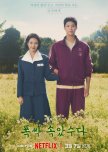
A ROMANCE OF HUMOR AND DELIGHT
Every now and then, a drama comes along that feels like a breath of fresh air—something that doesn’t just entertain but wraps you up in its world so completely that you forget about everything else for a while. "Perfect Match" (2025) is one of those rare gems. It’s a historical romance set in the Northern Song Dynasty, but don’t let that make you think it’s all stiff court politics and brooding emperors. Instead, this drama is vibrant, full of life, and centers around something far more universal—family, love, and the search for happiness in a world full of expectations.The heart of the story is Madam Li, a sharp, witty, and fiercely determined widow who moves her family to Bianjing, the bustling capital, to reunite with her second daughter and, more importantly, find good matches for her remaining four daughters. Now, if you think this is just another "mother-obsessed-with-marriage" drama, you’d only be half right. Yes, Madam Li is relentless, but she’s also deeply loving, and her daughters? They’re not passive little girls waiting for husbands. They each have their own dreams, struggles, and personalities that make this story so rich and engaging.
Liu Xiening plays the eldest daughter, Shouhua, a young widow who’s resigned to never marrying again. She’s wise and composed, but beneath that calm exterior, you can sense the weight of her past. Then there's Haode, the fourth daughter, who is straightforward and a bit too honest for her own good, leading to some of the show’s funniest moments. And Wuniang, the youngest, is spoiled but in a way that’s more endearing than frustrating.
But one of the standout relationships for me in the drama is between the fiery and independent Li Kangning and the sharp-witted Chai An. Kangning, played by Lu Yuxiao, is known as the "Rouge Tiger" for a reason—she’s bold, fearless, and doesn’t let anyone tell her what to do. Her interactions with Chai An (Wang Xingyue) are some of the most entertaining in the series. Their relationship starts off with bickering and competition, but as the story unfolds, their dynamic deepens into something much more meaningful. What makes them special isn’t just their undeniable chemistry, but the fact that they challenge each other in ways that help them grow. They’re a perfect example of a couple that starts as rivals and ends up as true partners, making every moment between them a delight to watch.
That said, every couple in "Perfect Match" has its own charm. Shouhua’s slow-burn romance with the gentle and scholarly Du Yangxi is touching in its quiet sincerity. Haode and Shen Huizhao have a straightforward yet deep connection, with Shen Huizhao’s calm and steady nature complementing Haode’s blunt honesty. Wuniang’s romance with the playful and mischievous Yang Xian adds a lighthearted contrast to some of the more serious relationships. And beyond these couples, the series also weaves in the story of Madam Li’s second daughter, Fuhui, and her marriage, giving a broader perspective on love, duty, and compromise.
What makes "Perfect Match" truly shine is its ability to balance humor, romance, and emotional depth. One moment, you’re laughing at a misunderstanding or a cleverly written exchange, and the next, you’re hit with a moment so heartfelt that it stays with you long after the episode ends. The dialogue is sharp and full of wit, making even the most dramatic scenes feel natural rather than overly melodramatic. The relationships feel real, filled with ups and downs, misunderstandings, and growth, which makes the eventual resolutions all the more satisfying.
Visually, the drama is a feast for the eyes. The production team clearly put immense effort into bringing the Northern Song Dynasty to life. The bustling streets of Bianjing, the intricate details of the teahouse, and the beautiful period costumes all contribute to the immersive experience. The cinematography is breathtaking, capturing not just the grandeur of the setting but also the small, intimate moments that make the love stories feel so genuine. Every frame feels thoughtfully composed, making it clear that this is a production that values both substance and style.
Despite all its strengths, "Perfect Match" isn’t without its flaws. Some viewers might find the pacing uneven at times, especially since the story shifts between six different couples. While this structure allows for a rich exploration of different relationships, it can also leave you impatient when the focus moves away from your favorite pairing. Additionally, there are moments where the comedy leans a bit too heavily into exaggerated antics, though these are largely outweighed by the drama’s many heartfelt moments.
Ultimately, what makes "Perfect Match" so memorable is the warmth it leaves behind. It’s a drama that celebrates love in all its forms—romantic love, familial love, and the love that comes from truly understanding oneself. It reminds us that a "perfect match" isn’t just about finding someone who meets a list of criteria—it’s about finding the person who makes you feel at home.
For anyone looking for a drama that is equal parts charming, emotional, and beautifully crafted, "Perfect Match" is an absolute must-watch. It doesn’t just tell one love story—it gives you six, each unique in its own way, and all of them equally compelling. Whether you’re drawn to fiery romance, slow-burn longing, or lighthearted flirtation, there’s something here for everyone. And by the time the final episode rolls around, you’ll find yourself wishing you could spend just a little more time with these characters who feel like old friends.
Was this review helpful to you?

DO NO WRONG FEAR NO GUARDIANS!
If you’re looking for a show that blends historical drama, fantasy, and a good dose of comedy, Guardians of the Dafeng might just be your next binge. Based on the web novel Da Feng Da Geng Ren, this Chinese drama is a refreshing mix of clever storytelling, vibrant characters, and a touch of modern wit.
The story kicks off when Xu Qi’an, played by the charismatic Dylan Wang, wakes up in the ancient Dafeng Dynasty. Oh, and he’s in a prison cell. Great start, right? But Xu Qi’an isn’t your average guy—he’s a recent police academy graduate from the modern world. Armed with his contemporary detective skills and a sharp mind, he soon finds himself solving crimes and working alongside the Guardians, a kind of ancient law enforcement group.
What makes this show stand out is how Xu Qi’an uses modern knowledge in a historical setting—it’s like Sherlock Holmes meets time travel. Plus, his growing bond with Princess Lin’an (Tian Xiwei) adds a romantic and emotional layer to the story.
Dylan Wang shines as Xu Qi’an. He’s witty, resourceful, and full of modern-day sass, which makes his interactions with the traditionalists of Dafeng both hilarious and intriguing. Tian Xiwei’s Princess Lin’an is equally lovable, bringing both charm and depth to her role. The show’s set in a world where Confucians, Taoists, demons, and sorcerers coexist, making it a rich and magical setting. The production design and costumes are top-notch, pulling you into the Dafeng Dynasty with ease. Beyond the fantasy and humor, Guardians of the Dafeng is also a solid mystery-drama. Each episode builds on the last, keeping you hooked with twists, political intrigue, and Xu Qi’an’s clever problem-solving.
Whether you’re into historical dramas, fantasy, or just looking for a show that makes you laugh while keeping you on the edge of your seat, Guardians of the Dafeng delivers. Its unique mix of genres and engaging storytelling makes it a standout in the 2025 drama lineup.
Was this review helpful to you?

This review may contain spoilers
A DEEP DIVE IN TO SURVIVING THEIR OWN MONSTERS
As a longtime fan of gritty school dramas, I went into Weak Hero Class 2 with high hopes and a tight chest. The first season delivered a raw, unforgettable punch — both literally and emotionally — so the stakes for this sequel were sky-high. I didn’t just want more brutal fight scenes or tense schoolyard showdowns. I wanted emotional growth, deeper scars, and something that meant something. And wow — this season delivered all of that and more.What makes this second season hit harder is how much more layered everything feels. It’s no longer just about Yeon Si-eun, the quiet, calculating top student, outsmarting bullies with strategy and grit. Now, it’s about what comes after trauma — after betrayal, after pain, after the loss of someone who had your back. This time, Si-eun’s story is less about surviving the fight and more about surviving himself — the guilt, the numbness, and the growing fear that maybe he’s turning into exactly what he hates.
The Fight Gets Bigger — and More Personal
Season 2 begins with Si-eun transferring to Eunjang High School, hoping to keep a low profile. But of course, nothing stays quiet for long. Eunjang is run by a powerful and vicious group called the Alliance — a gang that isn’t just about brute strength, but complete control. At the top is Na Baek-jin, cool and terrifying in equal measure, and Geum Sung-je, whose temper and ruthlessness make him one of the most dangerous characters this show has seen yet.
Thrown into this new battlefield, Si-eun tries to stay out of trouble — but his reputation precedes him. Soon, he's drawn into a new conflict where survival isn't just about strength — it’s about loyalty, consequences, and trust. Along the way, he meets Park Hoo-min, a mysterious classmate with quiet strength and a painful past, and Seo Joon-tae, a soft-spoken and timid student who has long been the target of bullying — until Si-eun helps him realize that he doesn’t have to live in fear anymore.
Together with Go Hyun-tak — a surprisingly thoughtful brawler — Si-eun begins to build something he’s been missing since the events of Season 1: a real sense of brotherhood.
Characters: Complex, Flawed, and So Real It Hurts
Let’s talk about these characters, because this cast of misfits and fighters is what gives the season its emotional weight.
Yeon Si-eun is more emotionally distant now, colder in the way he interacts with others, but also more self-aware. You can feel that he’s afraid of getting close again — afraid of failing someone the way he failed Su-ho. He’s sharper than ever in fights, but lonelier than ever outside of them. His journey this season is about figuring out who he wants to be, not just how to win.
Park Hoo-min is a standout — calm, calculating, and quietly loyal. His past is slowly revealed through the season, and it’s heartbreaking. The connection between him and Si-eun isn’t immediate, but when it clicks, it’s one of the most compelling dynamics in the show. Both are damaged in different ways, but there’s this unspoken understanding between them that builds beautifully.
Seo Joon-tae, in contrast to many of the louder characters, brings a quiet kind of strength to the group. He starts off as a timid, anxious student who’s endured prolonged bullying. But through his interactions with Si-eun — who never talks down to him, never pities him — he slowly begins to find his footing. His growth isn’t flashy, but it’s powerful. By the end of the season, Joon-tae proves that bravery doesn’t always come with fists — sometimes it’s just the courage to stand your ground.
On the antagonist side, Na Baek-jin is chilling in how composed he is. He’s not just a schoolyard thug — he’s a strategist, a manipulator, and a reflection of what Si-eun could become if he lost his grip on empathy. Geum Sung-je, meanwhile, is pure chaos — a wildcard with a temper and a personal grudge that makes every scene he’s in feel like it could explode.
Direction and Visual Style: Grit Meets Precision
Every shot in Weak Hero Class 2 feels intentional. The fight scenes are raw and immediate — no music, no glamour, just fists, grit, and the sound of breath being knocked out of bodies. The violence isn’t stylized — it’s uncomfortable, and that’s what makes it so effective. It’s not just entertainment; it’s a warning.
Themes: Power, Pain, and the Cost of Resistance
Like its first season, Weak Hero Class 2 doesn't shy away from hard truths. It shows us what happens when systems fail — when schools ignore violence, when adults disappear, and when justice becomes something you have to fight for on your own. But it also asks deeper questions this time: What does it cost to stand up? Can revenge ever heal you? And is there still space for connection in a world where trust is a weapon?
The strongest theme running through the season is this: You don’t win by fighting the hardest. You win by refusing to stop caring — even when the world punishes you for it.
Final Thoughts: A Worthy Sequel That Cuts Even Deeper
Weak Hero Class 2 is brutal, emotional, and deeply personal. It could have taken the easy route — bigger fights, flashier villains — but instead it dug deeper, showing us that strength isn't just about fists, but about the courage to open your heart again, even when it’s been shattered.
If Season 1 was about survival, Season 2 is about healing — the slow, painful, messy kind that doesn’t come with closure but still matters.
Was this review helpful to you?

A SATISFYING AND EMOTIONAL JOURNEY
There’s a certain kind of drama that doesn’t just tell a story—it lingers with you long after the screen fades to black. The Prisoner of Beauty is exactly that kind of show. It quietly pulls you in with its delicate balance of political intrigue, slow-burn romance, and emotional complexity, all wrapped in stunning visuals and grounded performances that really hit home.The story follows Xiao Qiao (played by Song Zu’er), who steps into an arranged marriage that was originally meant for her sister. She does it to help bring peace between two clans that have been at odds for years. Her husband, General Wei Shao (played by Liu Yu Ning), is a tough, battle-worn general who’s super loyal to his people but emotionally closed off because of everything he’s been through. At first, there’s a lot of distance and mistrust between them, but watching their relationship slowly evolve into something real and meaningful was honestly one of the best parts of the show.
What I really loved was how the drama didn’t rush their connection. It took its time showing them learning to understand each other, relying on each other, and eventually, falling in love in this quiet, powerful way. I’ve seen some people say the leads didn’t have chemistry, but I totally disagree. Their chemistry wasn’t loud or flashy, but it felt real. Their small glances, shared silences, and the way they stood by each other through everything—that’s what made it special for me.
But what really hit me was the emotional weight of the choices they had to make. This wasn’t some fairytale where everything magically works out. They paid a price for peace. Both of them had to make heartbreaking sacrifices, and the drama didn’t shy away from showing how heavy that burden was. It was raw and painful at times, but it made their journey feel that much more genuine. Peace came, but it left scars.
I know some people felt the ending was a bit rushed—and yeah, the last couple of episodes did move a little faster—but I didn’t feel like it ruined anything. The show had built up enough emotionally that the payoff still landed for me. I felt satisfied, even if a part of me wished for more time with them.
Visually, the drama was stunning. The costumes, the sets, the cinematography—everything was just beautifully done. There were so many moments where I paused just to take it all in. And the soundtrack? Subtle, emotional, and totally on point.
In the end, The Prisoner of Beauty gave me everything I hope for in a historical drama: layered characters, a romance that feels earned, stakes that actually matter, and a story that respects the audience. It reminded me that love doesn’t always come in grand declarations—it’s sometimes found in shared purpose, quiet strength, and choosing each other in the middle of chaos.
If you’re into historical dramas that are emotional, thought-provoking, and beautifully crafted, I really recommend giving this one a try. You won’t regret it.
Was this review helpful to you?

This review may contain spoilers
SEO KANG JOON IS BACK!!!
Every once in a while, a drama comes along that’s just pure fun—and Undercover Highschool fits that bill perfectly. With its mix of undercover missions, ridiculous high school antics, and a hidden treasure plot that sounds like it came straight out of a comic book, this 2025 K-drama doesn’t take itself too seriously—and that’s exactly why it works.At the heart of the chaos is a secret agent (played by Seo Kang Joon) who’s sent to pose as a high school student. His mission? Find a stash of gold bars that’s been hidden somewhere within the school grounds. It’s as wild as it sounds—and somehow, it works. What starts off as a slightly ridiculous premise quickly turns into a fast-paced adventure, with just enough mystery and clever twists to keep you invested.
Seo Kang Joon leads the drama with sharp charisma and an effortless balance between action and comedy. This marks his return to the small screen after completing his military service, and honestly, it’s a great choice for a comeback project. He handles the action scenes with a cool confidence, and his comedic timing gives the character a fun, unexpected edge.
One thing longtime fans might notice, though, is the lack of romance. Seo Kang Joon has always been particularly strong in emotionally charged, romantic roles, and it’s a bit of a shame that Undercover Highschool doesn’t really lean into that side of him. There are a few moments that feel like they could’ve led to something deeper, but the drama clearly chooses to stay focused on the action-comedy route. It’s not a major flaw, but if you’re hoping for swoon-worthy scenes, you might be left wanting more.
The supporting cast brings a ton of personality to the story—from oddball classmates to suspicious teachers—and the energy stays high all the way through. There’s a kind of comic-book charm to the way the story unfolds, filled with over-the-top moments and just enough heart to keep things grounded. The pacing is tight, the visuals are crisp, and the soundtrack knows when to turn up the tension—or lean into the laughs.
All in all, Undercover Highschool doesn’t try to be the deepest or most dramatic story out there, but it knows exactly what kind of show it wants to be. It’s entertaining, fast-paced, and full of fun characters you’ll enjoy watching—even if they’re totally chaotic. If you’re looking for a break from heavy plots and just want something to enjoy with a bowl of popcorn, this one’s worth queuing up.
Was this review helpful to you?

THE POTRAYAL OF JWELLERY BUSINESS IN REALISM
I just finished *The Story of Pearl Girl*, and honestly, it’s a solid drama with a lot to love. The story follows Duanwu (Zhao Lusi), who starts off as a pearl diver living under harsh conditions. She crosses paths with Yan Zi Jing (Liu Yuning), a merchant on a revenge mission, and that meeting completely changes her life. From there, it’s all about her journey of self-reinvention and empowerment.
Zhao Lusi is fantastic as Duanwu. She captures the character’s transformation so well, from a powerless young woman to someone fiercely determined to take charge of her life. But let’s not overlook Liu Yuning—he absolutely nails his role as Yan Zi Jing. He brings a quiet intensity to the character, making him complex and compelling. He’s got this brooding yet protective energy that works perfectly, especially in the scenes where his softer side peeks through.
While romance isn’t the main focus, the relationship between Duanwu and Yan Zi Jing is beautifully done. It develops naturally over time, and their chemistry feels authentic. It’s not a sweeping, over-the-top love story, but that’s what makes it feel real. Their bond adds depth to the story without taking over, making it a lovely side plot to the main narrative of Duanwu’s growth.
Visually, this show is stunning. The Tang Dynasty setting is brought to life with incredible attention to detail—the costumes, the sets, and even the pearl-diving scenes are so well done. You can tell they put a lot of effort into making everything feel authentic. There are a few hiccups with lighting in some scenes, but it’s not enough to pull you out of the experience.
The Story of Pearl Girl* is a great mix of empowerment, drama, and just the right touch of romance. Zhao Lusi and Liu Yuning both deliver performances that keep you invested, and the production quality makes it a feast for the eyes. If you’re into period dramas with strong characters and heartfelt storytelling, this one’s worth checking out.
Would I watch it again? Maybe not immediately, but it’s definitely a show I’d recommend to others. It’s one of those dramas that stays with you long after it’s over.
Was this review helpful to you?

A SIMPLE BRAIN ROT
The Potato Lab isn’t the kind of drama that’s going to change your life—but it doesn’t really try to. It’s light, silly, and strangely comforting in its own way. What makes it extra special for fans is that it marks the much-anticipated comeback of the male lead after completing his military service. You can tell he was ready to jump back in—he brings solid charm and likability, even when the script gets a little wobbly.Set in a small, quirky research facility that studies (of all things) potatoes, the drama builds its world with a slice-of-life tone and a sprinkle of science-y humor. It’s not deep or intense, and that’s kind of the point. It’s the kind of show you watch when you don’t want to think too hard—just something simple and fun to have on while you unwind.
That being said, the plot does stumble over itself a few times. There are classic K-drama issues, like long-winded misunderstandings that could be cleared up with one honest conversation. Instead, characters opt for the scenic route of silence, guilt, and dramatic stares.
The female lead, while sweet and gentle, leans a little too far into the self-sacrificing type. She forgives easily, avoids confrontation, and tends to bottle everything up—which can be frustrating to watch. It’s hard not to wish she’d just say what she’s thinking instead of letting things slide.
Despite all that, The Potato Lab is still a pretty enjoyable ride. It’s not trying to be anything more than what it is: a light-hearted, easy drama with a slightly absurd premise. The pacing is breezy, the chemistry is decent, and there are enough feel-good moments to keep you engaged (especially if you like soft, healing-type stories).
So no, it’s not perfect. But it’s a decent time-pass, especially for fans of the male lead or anyone who just wants to chill with something cute, quirky, and low-pressure. Just don’t expect too much logic—think potatoes, not plot twists.
Was this review helpful to you?

This review may contain spoilers
A SIMPLE HISTORICAL ROM-COM WITH A MODERN TOUCH
Review of 2025 C-Drama Les BellesA Beautiful Romance That Starts Strong but Loses Its Way
Les Belles (2025) is a historical romance drama that hooks you in with stunning visuals, a compelling love story, and plenty of tension between the leads. However, as the story progresses, what starts as a charming and intense romance slowly gets weighed down by unnecessary drama—particularly an obsessive second male lead and a war subplot that feels completely out of place.
The Story: From Fiery Encounters to Unexpected Love
The drama follows Luo Lingyu (Lin Yun), a noblewoman whose life is turned upside down when her once-powerful family falls from grace. With nowhere else to go, she travels with her younger sister to Jianye, hoping to seek refuge with distant relatives. However, fate has other plans when she has an unfortunate run-in with Lu Yun (Fang Yilun)—a seemingly cold and arrogant young master who, unbeknownst to her, is part of the very family she’s trying to turn to for help. Their first meeting? A heated argument that ends with her shoving him overboard.
What follows is a classic "enemies-to-lovers" romance filled with sharp banter, undeniable chemistry, and a slow-burning attraction. Lu Yun, initially skeptical of Luo Lingyu’s intentions, gradually finds himself drawn to her resilience and intelligence. Meanwhile, Luo Lingyu, despite her strong will, starts seeing past his arrogant exterior and into the man beneath. Their relationship builds steadily, making for a satisfying and engaging love story—at least for most of the drama.
Where It Falls Apart
While Luo Lingyu and Lu Yun’s love story is the highlight of the drama, Les Belles stumbles in a few areas. One of the biggest frustrations is the obsessive second male lead, who starts off as a likable character but gradually becomes overbearing. What initially seems like sweet admiration turns into a repetitive, exhausting subplot where he refuses to move on, dragging out unnecessary drama between the leads.
And just when it seems like the drama is reaching a natural and satisfying conclusion, it suddenly introduces a war subplot in the final episodes. This shift feels abrupt and disconnected, as if the writers felt the need to add high-stakes conflict but didn’t know how to integrate it smoothly into the story. Instead of focusing on the emotional payoffs that had been carefully built up, the drama diverts attention to war-related tensions that feel unnecessary and rushed.
What Works & What Doesn’t?
✔ Breathtaking Cinematography – The visuals are absolutely stunning, from the intricate costumes to the beautifully crafted set designs. Every scene looks like a painting.
✔ Strong Chemistry Between Leads – Lin Yun and Fang Yilun carry the romance with their performances, making their characters’ relationship feel natural and engaging.
✔ A Well-Built Love Story (At First) – The gradual development between Luo Lingyu and Lu Yun is satisfying, with a good balance of tension, affection, and emotional depth.
❌ The Obsessive Second Male Lead Becomes a Headache – His infatuation with Luo Lingyu starts off as harmless but drags on for far too long, making it frustrating to watch.
❌ The War Subplot Feels Unnecessary – Instead of wrapping up the romance properly, the last few episodes shift into an abrupt and out-of-place war storyline that disrupts the flow.
Was this review helpful to you?

This review may contain spoilers
TO SAVE LIVES!
The Trauma Code: Heroes on Call is a standout 2025 South Korean medical drama that has firmly cemented its place as a must-watch for fans of the genre. With Ju Ji-hoon leading the charge as the brilliantly complex Dr. Baek Kang-hyuk, the series masterfully balances high-stakes medical emergencies, layered character development, and moments of both humor and heartbreak. What makes this drama truly remarkable is how it stands tall without relying on a romance subplot. The story is so gripping and well-crafted that you never miss a love line — instead, you’re drawn in by the action, tension, and camaraderie. From start to finish, there’s not a single dull second, and every episode leaves you hungry for more.The plot centers on Dr. Baek Kang-hyuk, a world-renowned trauma surgeon who’s spent years in the trenches of global conflict zones, honing his skills in the harshest environments. Now back in Korea, he’s tasked with rebuilding the trauma center at Hankuk University Hospital, a neglected department plagued by budget cuts and bureaucratic inefficiencies. Dr. Baek is as sharp as his scalpel and as brash as they come — unafraid to butt heads with hospital administrators or call out his colleagues when they fall short. But beneath his rough exterior lies a deep commitment to saving lives, no matter the cost.
Joining him on this journey is Yang Jae-won, played with heartfelt sincerity by Choo Young-woo. Jae-won starts off as a privileged, somewhat naïve young doctor who initially struggles to find his footing under Baek’s demanding leadership. And when I say “demanding,” I mean Baek spends the better part of the show calling him “Anus” or “No.1 (Slave)” instead of his actual name. It’s equal parts brutal and hilarious, but it’s all part of Baek’s unorthodox way of pushing his team to be their absolute best.
One of the most emotionally satisfying moments of the series comes when Baek finally calls Jae-won by his real name. Jae-won’s joy in that moment is so genuine, you can’t help but feel it with him. It’s a milestone in their dynamic, signaling not just Baek’s acknowledgment of Jae-won’s growth but also a rare moment of warmth from the gruff trauma surgeon. And as if that wasn’t enough, Jae-won celebrates by learning how to curse with gusto — something Baek has unintentionally taught him throughout their time together. Seeing the once-innocent rookie unleash a stream of expletives with pride is both hilarious and oddly heartwarming, perfectly encapsulating his journey from a wide-eyed newbie to a confident, capable doctor.
Another highlight comes when Jae-won finally finds his own “No. 2” — a junior doctor who will be joining their trauma team. Watching him step into a leadership role, guiding someone else through the same challenges he faced, is such a rewarding full-circle moment. It’s a testament to how far he’s come, not just in his skills but in his ability to inspire and lead others.
Ju Ji-hoon delivers a magnetic performance as Dr. Baek, effortlessly commanding every scene he’s in. Whether he’s barking orders in the operating room, tearing into hospital administrators, or delivering heartfelt advice to his team, he’s impossible to look away from. Honestly, I could watch him curse out incompetent staff or fight for his patients for an entire episode and still beg for more. Choo Young-woo, on the other hand, brings a perfect balance to the show with his portrayal of Jae-won. His transformation feels so authentic that you’ll find yourself rooting for him every step of the way.
The pacing of The Trauma Code: Heroes on Call is flawless. It never drags, jumping seamlessly from intense medical crises to quieter, character-driven moments. The show doesn’t just highlight the physical toll of trauma surgery but also the emotional and moral dilemmas that come with it. Every life-or-death scenario feels urgent and raw, and the series isn’t afraid to show the harsh realities of the medical world, from bureaucratic red tape to the constant struggle for funding.
This drama proves that a great story doesn’t need romantic entanglements to be compelling. The relationships between the characters — whether it’s the mentor-mentee dynamic between Baek and Jae-won or the camaraderie among the trauma team — are more than enough to keep you emotionally invested.
Simply put, The Trauma Code: Heroes on Call is a masterclass in storytelling, blending action, humor, and heart in a way that feels both fresh and deeply satisfying. If you’re a fan of medical dramas, this one’s a no-brainer. And even if you’re not, the sheer charisma of Ju Ji-hoon and the gripping plot will win you over. Here’s hoping Netflix gives us a second season soon because these characters and their stories have so much more to offer.
Was this review helpful to you?

A SIMPLE WATCH ON SURVIVAL
If you’re looking for a K-drama that’s as unpredictable as a zombie apocalypse, Newtopia is definitely the one to check out. The story takes place in a future Seoul, which is suddenly overrun by zombies, and follows Lee Jae-yoon (Park Jeong-min), a soldier doing his mandatory military service, and Kang Young-joo (Jisoo), an engineer who’s just trying to survive. Jae-yoon and Young-joo aren’t exes—they’re still very much together—but things get pretty intense as they try to figure out how to handle the zombie chaos while also juggling their personal drama and a little romance along the way.Now, let’s talk about the cast. Park Jeong-min is solid as the soldier trying to keep his cool in the middle of everything going to hell. But Jisoo? She really brings it. You might know her from Snowdrop, but here, she’s showing off a whole new side. She plays Young-joo with a cool confidence, but you can also see the vulnerability underneath. She definitely holds her own, and you can tell she’s ready to dive into the chaos with everything she’s got.
The show’s supporting characters add a lot of flavor to the mix. They don’t necessarily move the plot forward, but they bring in some fun moments and quirky energy that balance out the more intense parts of the show. And speaking of balance—Newtopia is a bit of a genre blender. One minute, it’s a rom-com with some zombie action sprinkled in, and the next, it’s a full-on thriller. Sometimes that shift can feel jarring, but I kind of loved how it kept me on my toes. If you’re expecting a straight-up zombie horror series, this might not be it, but if you’re into shows that mix genres and keep you guessing, it’s definitely worth a watch.
The reviews for Newtopia have been a bit mixed, and honestly, I get why. Some people love the offbeat, genre-bending vibe, while others wish the plot was a bit more focused. If you’re looking for a traditional, serious zombie series, you might want to skip this one. But if you’re down for something that keeps you guessing and throws in some laughs along the way, you might just find yourself hooked.
Jisoo fans will love seeing her in this role—it's a far cry from her usual K-pop persona, and she nails it. And if you like a little romance with your zombie apocalypse (who doesn’t?), Newtopia definitely delivers. If you're more into intense, edge-of-your-seat thrillers, though, this might not be for you. But either way, it’s definitely one of the more unique K-dramas of 2025, and worth checking out if you're in the mood for something a little different.
Was this review helpful to you?

This review may contain spoilers
TO FIND MY HOME
Just wrapped up The Glory and wow... this one crept up on me in the best way.This isn't your typical palace drama packed with endless betrayals and over-the-top romance. It's a quietly intense revenge story that simmers beneath the surface—and once it clicks, it really pulls you in.
The story centers on Zhuang Han Yan, the third daughter of a powerful noble family who was basically tossed aside and left to fend for herself in the south. After 17 years of surviving under brutal conditions, she returns to the capital—not as a victim, but as someone who’s ready to rewrite her fate. Her goal? Reclaim her identity and expose the corruption that destroyed her life. Along the way, she partners with Fu Yun Xi, an upright court official who sees her potential—and slowly, something deeper starts to bloom between them.
WHAT I LOVED
1. Character growth that feels real
Han Yan starts off reserved and almost fragile, but you quickly realize she’s sharp—every move she makes is calculated. Chen Du Ling really grew on me; she doesn’t play Han Yan with loud dramatics, but with quiet strength. It’s refreshing to see a lead character who plays the long game, and actually learns from her pain rather than being consumed by it.
2. The vibes are immaculate
The cinematography is stunning. This drama is beautifully shot with natural lighting, detailed sets, and a muted color palette that fits the tone perfectly. The costume design? Elegant and understated. Everything looks expensive but not flashy—it sets the mood so well.
3. The slow-burn romance
There’s no swoon-heavy love story here, but the relationship between Han Yan and Fu Yun Xi is rooted in mutual respect and shared goals. It’s subtle, mature, and honestly more realistic than most drama romances. Xin Yun Lai plays Fu Yun Xi with calm intensity—he’s steady, observant, and clearly drawn to Han Yan’s strength.
4. Writing and plot
The plot is layered and well-paced (though slow at the start). There’s political maneuvering, secrets unraveling, and a deeply satisfying revenge arc. If you're a fan of smart female leads who get their wins through brains—not brute force—this one's for you.
What Didn’t Work as Well:
Some side characters felt underdeveloped, especially compared to how fleshed out Han Yan and Fu Yun Xi are. Would’ve loved more depth in a few of the antagonists.
Lead chemistry is very chill—if you like passionate, shippy moments, this might feel a bit too restrained. But personally, I liked the understated approach.
A quiet gem with rich storytelling, a strong female lead, and a beautiful visual aesthetic. It’s not trying to shock or thrill you every second—it’s here to unfold. If you’re into smart, emotionally grounded dramas that reward patient watching, The Glory is 100% worth your time.
Was this review helpful to you?

THE LOVE STORY OF SPRING
I went into The Best Thing expecting just another sweet romance drama, but what I got was so much more—a heartfelt story about healing, love, and finding comfort in the most unexpected places. Now that all 28 episodes have aired, I can confidently say this one left a lasting impression.Based on Sheng Li’s novel Loving You is the Best Thing I Have Done, the drama stars Zhang Linghe as He Suye, a gentle and thoughtful traditional Chinese medicine (TCM) doctor, and Xu Ruohan as Shen Xifan, a strong-willed hotel manager who’s been struggling with insomnia for years. Their love story unfolds in the quietest, most endearing ways—through late-night remedies, unexpected neighborly encounters, and the kind of small, thoughtful gestures that make your heart melt.
At the start, Shen Xifan is skeptical of He Suye’s treatments. She’s used to powering through life on her own, relying on caffeine and sheer willpower rather than herbal medicine and acupuncture. He Suye, on the other hand, is calm, patient, and always watching out for her, even when she insists she’s fine. Their relationship begins as a simple doctor-patient dynamic, but when they realize they live next door to each other, things start shifting in ways neither of them expect.
What I love about their romance is how natural it feels. There’s no over-the-top drama, no forced misunderstandings—just two people slowly letting their walls down. He Suye isn’t the type to rush into things; he expresses his care through quiet actions, like making sleep-inducing sachets for her or adjusting her diet plan to help with her insomnia. And Shen Xifan, despite her tough exterior, finds herself drawn to his warmth and steadiness. It’s the kind of relationship that builds gradually, making every little moment between them feel even more meaningful.
One thing that really stands out in The Best Thing is how visually stunning it is. Every scene feels carefully crafted, from the soft lighting in He Suye’s traditional clinic to the peaceful, moonlit streets where the characters share quiet conversations. The cinematography makes you feel like you’re right there with them, breathing in the scent of herbal tea or watching the city lights reflect on the river.
The drama also does an amazing job blending modern life with traditional Chinese culture. He Suye’s clinic, with its wooden cabinets filled with medicinal herbs, feels like a peaceful retreat from the chaos of the outside world. And the contrast between Shen Xifan’s fast-paced hotel job and He Suye’s slow, mindful approach to healing adds another layer of depth to their story.
For me, The Best Thing isn’t just a love story—it’s a reminder that love, in its purest form, is about care and understanding. Zhang Linghe plays He Suye with such quiet sincerity that you can’t help but fall for his character. And Xu Ruohan perfectly captures the struggles of someone learning to trust again. Their chemistry isn’t flashy, but it’s the kind that sneaks up on you and stays in your heart long after the final episode.
If you love slow-burn romances, thoughtful storytelling, and a drama that just feels good to watch, this one is definitely worth your time. It’s cozy, emotional, and leaves you with the kind of warmth that lingers—like a comforting cup of tea on a chilly night.
Was this review helpful to you?

AN ATTEMPT IN REBIRTH AND REDEMPTION
Going into Si Jin, I had pretty high expectations, especially with the cast lineup and the intriguing premise of rebirth and redemption. However, while the drama delivered in some areas, it fell short in others, making it an overall enjoyable but somewhat inconsistent experience.
First, let’s talk about the pacing. One of the biggest issues I had was how uneven it felt. Some episodes raced through major plot points so quickly that it was hard to fully absorb the emotional weight of certain scenes. Then, out of nowhere, the pacing would slow down significantly, dragging on with repetitive dialogue or filler scenes that didn’t add much to the story. This made it difficult to stay fully immersed, as I found myself either struggling to keep up or waiting for things to pick up again.
That being said, the storyline itself was compelling enough to keep me watching. The concept of Jiang Si getting a second chance at life after being betrayed and killed was really intriguing. Watching her take control of her fate, break off a bad engagement, and uncover deeper conspiracies kept things engaging. Her relationship with Yu Jin was a rollercoaster—one moment filled with intense chemistry, the next weighed down by angst and miscommunication. I wouldn't say their love story was the strongest part of the drama, but it had enough emotional pull to keep me invested.
As for the performances, Jing Tian did a solid job as Jiang Si. She carried the character’s transformation well, from a naive woman to someone determined to rewrite her destiny. Zhang Wan Yi, playing Yu Jin, also delivered, though at times his character felt underdeveloped. There were moments where I wished we got a deeper look into his emotions and motivations rather than just brooding stares. The supporting cast was decent, though some characters felt like they were just there to move the plot along rather than being fully fleshed out.
Production-wise, the cinematography was beautiful in some scenes, but in others, it felt a bit underwhelming. The costumes and set designs were nice, but not particularly memorable, which was disappointing given the potential for stunning visuals in a historical drama. There were moments where it felt like the show was trying to look grand, but the execution didn’t quite match up.
Despite its flaws, Si Jin was still worth the watch. It had its moments of brilliance—some intense emotional scenes, well-executed plot twists, and a lead character you could root for. If you enjoy historical romance dramas with a mix of revenge and redemption, it’s worth giving a shot. Just go in with managed expectations and be prepared for a somewhat bumpy ride in terms of pacing.
Was this review helpful to you?

A feel good, comfort movie
If you're looking for a movie that feels like a comforting hug, Hear Me: Our Summer is the perfect pick. Directed by Cho Sun-ho, this 2024 South Korean romantic drama gently pulls you into its world with a quiet, heartfelt story and characters who’ll stay with you long after the credits roll. It’s a remake of the Taiwanese classic Hear Me, but it’s got a charm that’s all its own.
The story revolves around Lee Yong-jun (played by Hong Kyung), a 26-year-old delivery guy working for his parents’ snack shop. Yong-jun doesn’t exactly have his life figured out yet—he’s drifting, not sure what his next step should be. But everything changes when he crosses paths with Seo Yeo-reum (played by Roh Yoon-seo) during a delivery to a group of deaf swimmers.
Yeo-reum is a fiercely supportive sister to Ga-eul, an aspiring Olympic swimmer who is hearing-impaired. From the moment Yong-jun meets Yeo-reum, he’s captivated—not just by her beauty but by her warmth and resilience. And here's where the film deviates from the usual tropes: Yong-jun already knows sign language. There’s no dramatic “learning to communicate for love” arc because he’s been using sign language in his everyday life, and this feels refreshingly natural. It allows their connection to develop organically, without any heavy-handed gestures or over-the-top romantic clichés.
What makes Hear Me: Our Summer truly special is its atmosphere. It’s a warm, feel-good movie that doesn’t rush or try too hard to tug at your heartstrings. Instead, it lets the small, quiet moments do the work. A lingering glance, a shared laugh, or a simple gesture speaks volumes. The chemistry between Hong Kyung and Roh Yoon-seo is understated yet electric—they don’t need dramatic proclamations or grand gestures to make you believe in their story.
Roh Yoon-seo is especially captivating as Yeo-reum. She has this effortless way of pulling you into her world, making you feel her joys, struggles, and quiet determination. Hong Kyung, as Yong-jun, is equally endearing. He perfectly captures that aimless, slightly lost feeling so many people in their twenties can relate to, and his journey toward finding purpose through love and connection is deeply satisfying to watch.
The film also deserves credit for its respectful portrayal of the deaf community. It’s clear that a lot of thought went into ensuring the representation feels authentic and meaningful. The use of sign language isn’t treated as a novelty or a gimmick—it’s just a natural part of the characters’ lives, seamlessly integrated into the story. This authenticity adds a layer of depth and sincerity that sets the movie apart.
Of course, no film is perfect, and Hear Me: Our Summer has its flaws. The pacing in the second half slows down a bit, and some viewers might find themselves wishing for a little more drama or tension. But for others, that’s precisely the point. This isn’t a movie about big, sweeping moments; it’s about finding beauty in the everyday, in the little things that make life—and love—worthwhile.
Visually, the film is stunning. The cinematography leans into soft, natural tones that perfectly complement the story’s gentle, comforting vibe. Scenes of summer days by the pool, quiet evenings lit by golden-hour sunlight, and simple yet meaningful settings like Yong-jun’s family shop add to the film’s intimate charm.
If you’re in the mood for a heartwarming, feel-good movie that doesn’t demand too much of you but still leaves you with a full heart, Hear Me: Our Summer is a lovely choice. It’s the kind of film that reminds you of the simple joys of human connection and the power of just being present with someone.
By the time the credits roll, you might not feel like you’ve watched a life-changing masterpiece, but you’ll feel like you’ve spent two hours wrapped in a cozy blanket of warmth and understanding. And really, isn’t that exactly what we need sometimes?
Was this review helpful to you?

A Tender Tale Told in Seasons
Sometimes a drama doesn’t just entertain you—it lingers. Like the scent of citrus on your hands after peeling a tangerine, When Life Gives You Tangerines stays with you long after the credits roll. It’s tender, nostalgic, and quietly devastating in the best way.
Set against the ever-changing yet timeless backdrop of Jeju Island, the drama follows the story of Ae-sun (IU) and Gwan-sik (Park Bo-gum), two people whose lives become intertwined from a young age through to adulthood. Structured in four seasonal acts—from their sun-drenched youth in the 1960s to the more muted hues of middle age and legacy—the series is a meditation on love, duty, and the little choices that end up shaping entire lives.
What stands out most in when life gives you Tangerines is how unafraid it is to take its time. It resists melodrama and big cliffhangers in favor of smaller, more intimate moments: a shared tangerine under the trees, a silent glance across a schoolyard, an old cassette tape full of promises. It's in these quiet scenes that the drama does its best work.
Lim Sang-choon's writing shines here—lyrical without being overwrought, emotional without leaning into clichés. And director Kim Won-seok knows exactly when to let the camera linger and when to pull back. The cinematography turns Jeju into a living memory: sun filtering through citrus groves, waves crashing against stubborn rocks, the rustle of old hanboks in the breeze.
Before IU and Park Bo-gum even take the stage, it’s the child actors who steal your heart.
Moon Woo-jin as young Gwan-sik is an absolute revelation. He plays the role with so much restraint and quiet intensity, capturing the gentle steadfastness that Park Bo-gum later expands on. You believe from the very first moment that this boy will grow into a man who loves deeply, silently, and for a lifetime. There’s one scene in particular—where young Gwan-sik, dirt under his nails, saves his lunch to share with Ae-sun—that might just be one of the most heart-wrenching and pure moments in the entire series.
Kim Soo-in, as young Ae-sun, is equally phenomenal. She plays Ae-sun with a spark—ambitious, defiant, and a little impulsive. There's a complexity to her performance that goes beyond her years. She makes you feel Ae-sun’s yearning, her frustration with her circumstances, and her dreams of becoming something more. The dynamic between the two young leads is so raw and believable that it sets the emotional tone for the rest of the series. Without them, the weight of the story wouldn’t land nearly as hard.
Truly, their performances are what make the transition to the adult actors feel earned, rather than jarring.
IU delivers a career-best performance as Ae-sun. She plays both Ae-sun and her daughter Geum-myeong with an emotional delicacy that’s hard to put into words. You feel every loss, every compromise, every spark of joy. There’s a weariness in her eyes that tells its own story.
Park Bo-gum, meanwhile, proves why he’s one of the most beloved actors of his generation. His Gwan-sik is a man of few words, but the way he holds space—for Ae-sun, for their shared memories, for his own quiet regrets—is deeply affecting. He doesn’t need grand gestures. He just is. It’s that quiet kind of love that K-dramas don’t always depict well, and here, it feels almost revolutionary.
When Life Gives You Tangerines isn’t for everyone—it’s a slow burn, steeped in nostalgia and weighted with quiet grief. But if you give it the time it deserves, it rewards you with a story that’s both deeply personal and beautifully universal.
It’s about growing up in the shadow of war and poverty, about the dreams we hold onto and the ones we leave behind. It’s about first love, sure—but more than that, it’s about enduring love. The kind that doesn’t always have a happy ending, but leaves you changed all the same.
And above all, it’s a love letter to Jeju, to the haenyeo who dive without fear, to the children who dream beyond their villages, and to the people who love in the quiet spaces of everyday life.
Was this review helpful to you?





